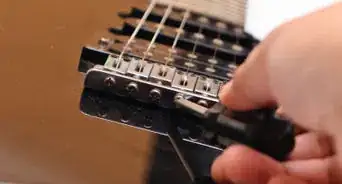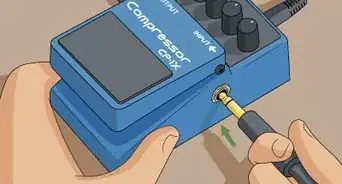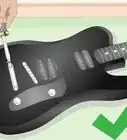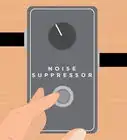This article was co-authored by Ron Bautista. Ron Bautista is a professional guitarist and guitar teacher at More Music in Santa Cruz, California and the Los Gatos School of Music in Los Gatos, California. He has played guitar for over 30 years and has taught music for over 15 years. He teaches Jazz, Rock, Fusion, Blues, Fingerpicking, and Bluegrass.
There are 9 references cited in this article, which can be found at the bottom of the page.
This article has been viewed 50,612 times.
There are no hard and fast rules for choosing a guitar to play heavy metal music. In fact, one can technically play heavy metal songs on any guitar. However, there are certain things to look for when buying a guitar to play heavy metal music. In contrast to classical music guitars which are hollow and acoustic, heavy metal guitars are usually electric and made with a solid body of wood. The appearance of a heavy metal guitar can also be quite distinctive. It often has sharp, pointy edges and an aggressive look. There are many things to consider when choosing a heavy metal guitar such as pickups, woodtone, electronics, scale length, bridge and tuning.[1] In the end, you should choose a heavy metal guitar that you can play, afford, and enjoy.[2]
Steps
Choosing the Right Guitar
-
1Figure out how much you want to spend. New and improved manufacturing techniques have introduced a wider range of guitars at the lower end of the market. There are many options to choose from even if you have a tight budget. For instance, one can get a decent guitar for $300.[3] If you have a bit more to spend (e.g., $500 – $1000), there are a wide range of moderate to higher priced guitars.[4]
- If you are a new player, you may want to purchase a lower end model. You can learn to play on lower end models and eventually work your way up to pricier models once you know the basics.
- Be honest with yourself. Simply buying expensive or signature models won't make you a great guitarist. You need to practice.
- If you already own a guitar or two, consider spending a couple hundred dollars more this time around. If you spend a little bit more, you will ensure you are improving your overall collection of guitars.[5]
-
2Figure out the key components for a heavy metal guitar. First, you will need an electric guitar. This is a guitar that needs to be plugged into an electric amplifier for any sound to be heard. They are often completely solid and very heavy. You can also buy hollow ones but they are not as good for heavy metal.[6] In addition, you will need an electric guitar with the right pickups, strings, and wood tones.[7]
- Choose an electric guitar with humbucker or active pickups. Humbucker pickups give the guitar a thick and beefy tone, which is great for the genre. Active pickups allow you to have more control of the sound.[8]
- Figure out the scale length you need. If you prioritize playability or are a newer player, go for the 24.75 inch scale. If you want a tighter response, go for the 25.5 inch scale.[9]
- Examine the electronics on the electric guitar. There are many options available such as phase switching, coil tapping and kill switches.[10]
- Decide on the bridge you want. The main choice is between fixed versus tremolo-equipped bridges. Tremolo bridges have springs to adjust spring tension, which allows you to raise and lower the pitch of all the strings at once. A fixed bridge is better for beginners.[11]
Advertisement -
3Choose a guitar style. You will need to think about stylistic choices when choosing the right guitar. For instance, you should ask yourself the following questions: Do I want a six string or an eight string instrument? What colors do I want?
- Decide on the colours and profile you want. Edgier profiles are more associated with the genre.[12]
- Decide whether you want a six string guitar or a seven or eight string instrument. Seven and eight strings are becoming popular amongst more experienced players. They allow for a greater range of notes.[13]
- Don't use hollow body guitars for extreme genres. It is better to buy solid body guitars because they sound better for heavy metal.
-
4Examine the materials and construction of the guitar. You should examine the wood used in the construction of the guitar body, as well as the shape and wood used for the guitar neck.[14]
- Choose a mahogany or basswood guitar. Mahogany is a great wood for heavy metal because it has deep and resonant tones. Basswood also sounds great and is less expensive.[15]
- Pay attention to the wood used in production of the neck. Rosewood, Maple, and Ebony are some woods that won't easily get clogged with dirt.
- Look at the neck of the guitar. Thinner necks can be a good choice if you are a new player.[16]
-
5Recognize the brands and equipment that are good for your genre. Some of the brands that are respected for this genre include Ibanez, Gibson, Schechter, Charvel and Dean.[17]
- Read guitar reviews in heavy metal magazines. By familiarizing yourself with the heavy metal scene, you will become familiar with the leading brands of heavy metal guitars.
- It is not recommended to buy a Fender with single coil pickups for heavy metal, although it is otherwise one of the best guitar models.
- Consider brands that are typically less expensive like Yamaha, Cort, Aria, Fernandez, Squier, or LTD. Don't forget the goal is to learn to play the guitar, rather than boasting.
- If you are a first time buyer, avoid purchasing expensive models with crazy shapes.
Shopping and Testing for Heavy Metal Guitars
-
1Decide where to go guitar shopping. Mom and pop stores offer better service. They will get your guitar set up and give regular maintenance. Online stores sometimes offer better prices but will not give you as much service or help.[18] You can also look for second hand guitars by talking to friends who play music or looking online. If you buy a second hand guitar, you will want to do more testing to make sure it is in good condition.
-
2Go guitar shopping with a friend. If you have a friend who knows more about guitars than you, bring them along when you go guitar shopping. They not only know about guitars but they know you as well. They can help you make a good decision.[19]
- If you have a guitar teacher, consider asking them for advice. They know how you play and the music you like, so they can also be a great source of advice when shopping for a guitar.[20]
-
3Prepare yourself to talk to the salesperson. The guitar salesperson will ask you questions about your price range, style, and playing ability. You should be able to tell them how much you want to spend, your preference for heavy metal and your experience with the genre. This will help them help you make the right decision.[21]
- Listen carefully to the salesperson and ask lots of questions about models, prices, and key characteristics of the various models.
- Avoid making a spur of the moment decision. If you decide on a guitar while talking to the salesperson in a guitar shop, it is probably best to write down your decision on a notepad and think about it for a day. This may help you avoid getting talked into buying the wrong guitar.
- Ask the guitar store if they will allow you to test the guitar for a couple days before deciding.
-
4Shop around for a second hand guitar. If you shop for a second hand guitar, you should look for a reliable individual (e.g., friend or relative with a guitar) or source (e.g., a guitar shop that carries secondhand guitars). You should pay special attention to the quality of the construction such as whether there are any loose components or cracks in the guitar.
- Ask an experienced player to go second hand guitar shopping with you. An experienced player will know what warning signs to look for in a second hand guitar, such as cracks in the neck or loose components.[22] If such warning signs are present, you should look elsewhere. Otherwise, you should simply look for the guitar that is right for you in terms of appearance, construction, and playability.
-
5Consider the appearance and construction of the guitar. You want to consider not only the look of the guitar but also how well constructed it is. You want to get a guitar that is both good looking and durable.[23]
- Reflect on the appearance of the guitars in the store. Do you like the way the guitar looks? Do you like the shape of the guitar? Do you like the colour? Of course, aesthetics does not determine how well the guitar sounds but you want a guitar that you like.[24]
- Look at the construction of the guitar. Check that the metal hardware is tightly screwed in and there is nothing rattling. Strum the open strings and listen for rattling. Run your hands along the neck of the guitar to see if the frets are smooth and correctly filed. If you are not sure how to do it, ask an experienced guitarist to check the frets for you.[25]
- Electric guitars go up to fret 22 or 24.[26]
-
6Feel out the playability and intonation of the guitar. You want to choose a guitar that will stay in tune and play well.[27] If your guitar is always falling out of tune, you may be less likely to play it. If it doesn’t feel right when you are playing, it might be harder to learn how to play.
- Consider the playability of the guitars in the store. Can you press the strings down to the fretboard pretty easily? Are the frets up the neck really hard to press down? They are typically a little harder to play but it shouldn’t require excessive stress.[28]
- Try playing an expensive guitar. Then switch back to playing an inexpensive model. Which feels more playable?
- Check the intonation of the guitars in the store. You should check to see if your guitar plays in tune. Play a 12th fret harmonic on the first string and match that to the fretted note at the 12th fret. The notes are different in tone but the pitch should be the same. If you have a hard time with this test, ask an experienced guitar player to do the test for you.
- If you don't like the way your guitar feels or sounds, you probably won't be motivated to play it.[29]
-
7Go for lunch and talk the purchase over with a friend or partner. Follow your natural shopping instinct. Is the guitar right for your ability and ambition? Talk it over with people who know you and your ability.
Choosing the Right Guitar Components and Accessories
-
1Choose the right guitar pick. The pick is an important tool, since it connects your body to the guitar. You want to choose the right pick for your style.[30]
- If you do a lot of tremolo picking, you want something with a medium pointy tip and a large thumb hold. Great for black metal tunes.[31]
- If you do more precise picking, you want something a little bit stiffer so you can define individual notes. This is great for death metal songs.[32]
- If you like fast shredding solos, choose something that is very stiff and pointy. This is great for power metal and thrash songs.[33]
- If you play doom or stoner metal, choose a lighter pick that allows you to get the most out of every note.[34]
- If you play punk rock, make yourself a homemade pick by punching out an old credit card.[35]
-
2Replace the strings on your guitar. You should pick strings that are designed for heavy metal. You will want guitar strings with a thicker gauge. Don’t purchase strings with a gauge below .010-.052. These will be too thin. On the other hand, you don’t want a gauge that is too thick because it will put a strain on your guitar neck and potentially alter the intonation.[36]
- Change your strings after purchasing your guitar. The strings on it will be testing strings. You can use different gauges for different sounds and tones.
- You know you need to replace your strings if they sound dull. You also know they need to be replaced if they sound out of tune or look dirty. If you don’t remember when you last changed them, you should definitely replace them.[37]
- You should replace all of your strings at once.[38]
-
3Find the right pickup for your guitar. Most importantly, choose one that fits your guitar. Figure out the characteristics you want, since some pickups are designed more for hum cancelling and others are simply very aggressive. The humbucker style is often favored by heavy metal guitarists.
Community Q&A
-
QuestionHey.! I m a begineer and m planning to buy an electric guitar ,here is the list of some of the guitar I've choosen after doing some research (1)ibanez grg150dxb (2)epiphone lp 2 (3)ibanez grg121dx (4)Washburn win14 (5)ibanez grx90 (6) cort cr100.or else can you recommend me some .
 Community AnswerI would recommend you test those models in a store. Play a few chords or a favorite song. Can you press the strings down to the fretboard with relative ease? How does it feel on your shoulders? Does it stay in tune? More important than the particular brand is how playable it is for you.
Community AnswerI would recommend you test those models in a store. Play a few chords or a favorite song. Can you press the strings down to the fretboard with relative ease? How does it feel on your shoulders? Does it stay in tune? More important than the particular brand is how playable it is for you. -
QuestionI'm playing in a hard rock/heavy metal band and I'm playing s Fender Stratocaster! Although it has humbuckers in it, it fits better than ESP or Jackson for heavy rock! The brutal truth! Besides, the pickups are passive.
 Community AnswerThanks for your input. Good to know your experience with the passive pickups.
Community AnswerThanks for your input. Good to know your experience with the passive pickups. -
QuestionHow much is an electric guitar?
 Community AnswerYou can get an inexpensive guitar for 300$ If you shop for a second hand guitar, you may be able to spend less but you should test the condition (see tips in the article above). If you have a bit more, you can get a nice guitar in the 500-1000$ range.
Community AnswerYou can get an inexpensive guitar for 300$ If you shop for a second hand guitar, you may be able to spend less but you should test the condition (see tips in the article above). If you have a bit more, you can get a nice guitar in the 500-1000$ range.
Warnings
- If you are going to buy a second hand guitar, examine whether it is in good condition or not.⧼thumbs_response⧽
References
- ↑ http://thehub.musiciansfriend.com/guitar-buying-guides/battle-axes-a-guide-to-guitars-for-metal
- ↑ https://books.google.ca/books?id=uV7TCCpQWmEC&pg=PA38&lpg=PA38&dq=how+to+test+a+heavy+metal+guitar&source=bl&ots=0Zi6pdZ9l4&sig=nQP6g3v92RJNEvhM_ciT4xKyqLs&hl=en&sa=X&ved=0ahUKEwjp8NrmzpHPAhXHJiYKHbBPBqsQ6AEIRzAI#v=onepage&q=how%20to%20test%20a%20heavy%20metal%20guitar&f=false
- ↑ https://spinditty.com/instruments-gear/Best-Heavy-Metal-Guitar-Under-300
- ↑ http://thehub.musiciansfriend.com/guitar-buying-guides/battle-axes-a-guide-to-guitars-for-metal
- ↑ https://books.google.ca/books?id=uV7TCCpQWmEC&pg=PA38&lpg=PA38&dq=how+to+test+a+heavy+metal+guitar&source=bl&ots=0Zi6pdZ9l4&sig=nQP6g3v92RJNEvhM_ciT4xKyqLs&hl=en&sa=X&ved=0ahUKEwjp8NrmzpHPAhXHJiYKHbBPBqsQ6AEIRzAI#v=onepage&q=how%20to%20test%20a%20heavy%20metal%20guitar&f=false
- ↑ http://www.musesmuse.com/ut/articles/guitar.html
- ↑ http://thehub.musiciansfriend.com/guitar-buying-guides/battle-axes-a-guide-to-guitars-for-metal
- ↑ http://thehub.musiciansfriend.com/guitar-buying-guides/battle-axes-a-guide-to-guitars-for-metal
- ↑ http://thehub.musiciansfriend.com/guitar-buying-guides/battle-axes-a-guide-to-guitars-for-metal
- ↑ http://thehub.musiciansfriend.com/guitar-buying-guides/battle-axes-a-guide-to-guitars-for-metal
- ↑ http://thehub.musiciansfriend.com/guitar-buying-guides/battle-axes-a-guide-to-guitars-for-metal
- ↑ http://thehub.musiciansfriend.com/guitar-buying-guides/battle-axes-a-guide-to-guitars-for-metal
- ↑ http://thehub.musiciansfriend.com/guitar-buying-guides/battle-axes-a-guide-to-guitars-for-metal
- ↑ http://thehub.musiciansfriend.com/guitar-buying-guides/battle-axes-a-guide-to-guitars-for-metal
- ↑ http://thehub.musiciansfriend.com/guitar-buying-guides/battle-axes-a-guide-to-guitars-for-metal
- ↑ http://thehub.musiciansfriend.com/guitar-buying-guides/battle-axes-a-guide-to-guitars-for-metal
- ↑ https://spinditty.com/instruments-gear/Best-Metal-Guitar
- ↑ https://books.google.ca/books?id=uV7TCCpQWmEC&pg=PA38&lpg=PA38&dq=how+to+test+a+heavy+metal+guitar&source=bl&ots=0Zi6pdZ9l4&sig=nQP6g3v92RJNEvhM_ciT4xKyqLs&hl=en&sa=X&ved=0ahUKEwjp8NrmzpHPAhXHJiYKHbBPBqsQ6AEIRzAI#v=onepage&q=how%20to%20test%20a%20heavy%20metal%20guitar&f=false
- ↑ https://books.google.ca/books?id=uV7TCCpQWmEC&pg=PA38&lpg=PA38&dq=how+to+test+a+heavy+metal+guitar&source=bl&ots=0Zi6pdZ9l4&sig=nQP6g3v92RJNEvhM_ciT4xKyqLs&hl=en&sa=X&ved=0ahUKEwjp8NrmzpHPAhXHJiYKHbBPBqsQ6AEIRzAI#v=onepage&q=how%20to%20test%20a%20heavy%20metal%20guitar&f=false
- ↑ https://books.google.ca/books?id=uV7TCCpQWmEC&pg=PA38&lpg=PA38&dq=how+to+test+a+heavy+metal+guitar&source=bl&ots=0Zi6pdZ9l4&sig=nQP6g3v92RJNEvhM_ciT4xKyqLs&hl=en&sa=X&ved=0ahUKEwjp8NrmzpHPAhXHJiYKHbBPBqsQ6AEIRzAI#v=onepage&q=how%20to%20test%20a%20heavy%20metal%20guitar&f=false
- ↑ https://books.google.ca/books?id=uV7TCCpQWmEC&pg=PA38&lpg=PA38&dq=how+to+test+a+heavy+metal+guitar&source=bl&ots=0Zi6pdZ9l4&sig=nQP6g3v92RJNEvhM_ciT4xKyqLs&hl=en&sa=X&ved=0ahUKEwjp8NrmzpHPAhXHJiYKHbBPBqsQ6AEIRzAI#v=onepage&q=how%20to%20test%20a%20heavy%20metal%20guitar&f=false
- ↑ https://books.google.ca/books?id=uV7TCCpQWmEC&pg=PA38&lpg=PA38&dq=how+to+test+a+heavy+metal+guitar&source=bl&ots=0Zi6pdZ9l4&sig=nQP6g3v92RJNEvhM_ciT4xKyqLs&hl=en&sa=X&ved=0ahUKEwjp8NrmzpHPAhXHJiYKHbBPBqsQ6AEIRzAI#v=onepage&q=how%20to%20test%20a%20heavy%20metal%20guitar&f=false
- ↑ https://books.google.ca/books?id=uV7TCCpQWmEC&pg=PA38&lpg=PA38&dq=how+to+test+a+heavy+metal+guitar&source=bl&ots=0Zi6pdZ9l4&sig=nQP6g3v92RJNEvhM_ciT4xKyqLs&hl=en&sa=X&ved=0ahUKEwjp8NrmzpHPAhXHJiYKHbBPBqsQ6AEIRzAI#v=onepage&q=how%20to%20test%20a%20heavy%20metal%20guitar&f=false
- ↑ https://books.google.ca/books?id=uV7TCCpQWmEC&pg=PA38&lpg=PA38&dq=how+to+test+a+heavy+metal+guitar&source=bl&ots=0Zi6pdZ9l4&sig=nQP6g3v92RJNEvhM_ciT4xKyqLs&hl=en&sa=X&ved=0ahUKEwjp8NrmzpHPAhXHJiYKHbBPBqsQ6AEIRzAI#v=onepage&q=how%20to%20test%20a%20heavy%20metal%20guitar&f=false
- ↑ https://books.google.ca/books?id=uV7TCCpQWmEC&pg=PA38&lpg=PA38&dq=how+to+test+a+heavy+metal+guitar&source=bl&ots=0Zi6pdZ9l4&sig=nQP6g3v92RJNEvhM_ciT4xKyqLs&hl=en&sa=X&ved=0ahUKEwjp8NrmzpHPAhXHJiYKHbBPBqsQ6AEIRzAI#v=onepage&q=how%20to%20test%20a%20heavy%20metal%20guitar&f=false
- ↑ Ron Bautista. Professional Guitarist & Guitar Instructor. Expert Interview. 5 November 2019.
- ↑ Ron Bautista. Professional Guitarist & Guitar Instructor. Expert Interview. 5 November 2019.
- ↑ https://books.google.ca/books?id=uV7TCCpQWmEC&pg=PA38&lpg=PA38&dq=how+to+test+a+heavy+metal+guitar&source=bl&ots=0Zi6pdZ9l4&sig=nQP6g3v92RJNEvhM_ciT4xKyqLs&hl=en&sa=X&ved=0ahUKEwjp8NrmzpHPAhXHJiYKHbBPBqsQ6AEIRzAI#v=onepage&q=how%20to%20test%20a%20heavy%20metal%20guitar&f=false
- ↑ Ron Bautista. Professional Guitarist & Guitar Instructor. Expert Interview. 5 November 2019.
- ↑ http://geargods.net/features/how-to-choose-the-right-guitar-pick-by-genre/
- ↑ http://geargods.net/features/how-to-choose-the-right-guitar-pick-by-genre/
- ↑ http://geargods.net/features/how-to-choose-the-right-guitar-pick-by-genre/
- ↑ http://geargods.net/features/how-to-choose-the-right-guitar-pick-by-genre/
- ↑ http://geargods.net/features/how-to-choose-the-right-guitar-pick-by-genre/
- ↑ http://geargods.net/features/how-to-choose-the-right-guitar-pick-by-genre/
- ↑ http://www.guitarfella.com/best-guitar-strings/metal/
- ↑ https://books.google.ca/books?id=uV7TCCpQWmEC&pg=PA38&lpg=PA38&dq=how+to+test+a+heavy+metal+guitar&source=bl&ots=0Zi6pdZ9l4&sig=nQP6g3v 92RJNEvhM_ciT4xKyqLs&hl=en&sa=X&ved=0ahUKEwjp8NrmzpHPAhXHJiYKHbBPBqsQ6AEIRzAI#v=onepage&q=how%20to%20test%20a%20heavy%20metal%20guitar&f=false
- ↑ https://books.google.ca/books?id=uV7TCCpQWmEC&pg=PA38&lpg=PA38&dq=how+to+test+a+heavy+metal+guitar&source=bl&ots=0Zi6pdZ9l4&sig=nQP6g3v 92RJNEvhM_ciT4xKyqLs&hl=en&sa=X&ved=0ahUKEwjp8NrmzpHPAhXHJiYKHbBPBqsQ6AEIRzAI#v=onepage&q=how%20to%20test%20a%20heavy%20metal%20guitar&f=false

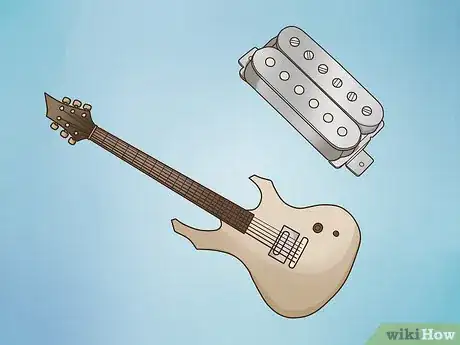
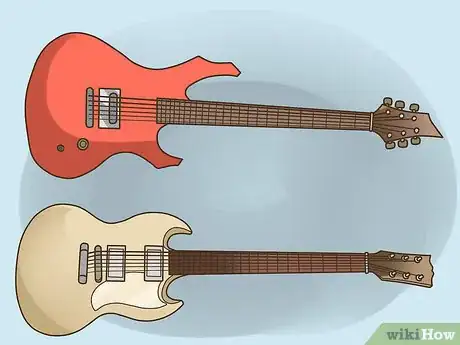




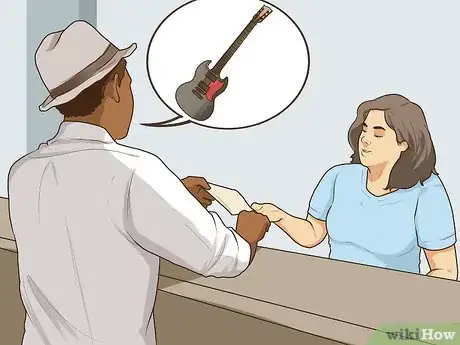





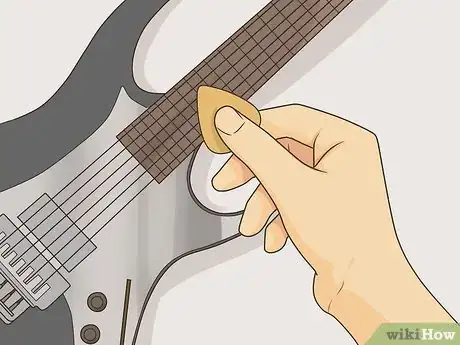

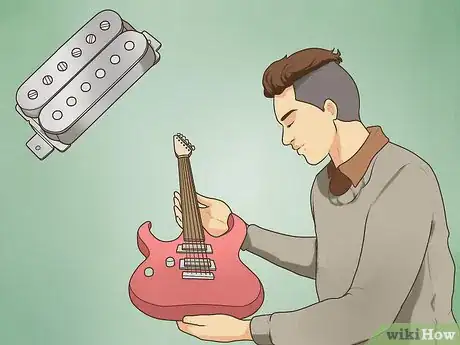

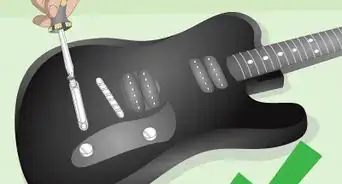
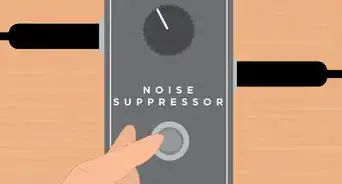

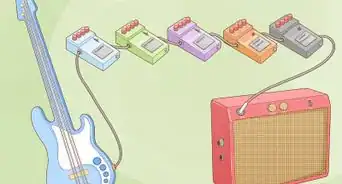
-Step-19-Version-2.webp)
